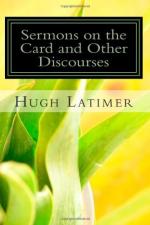the same, with all other like abuses in the church,
may be reformed easily. “It is but a little
abuse,” say they, “and it may be easily
amended. But it should not be taken in hand
at the first, for fear of trouble or further inconveniences.
The people will not bear sudden alterations; an insurrection
may be made after sudden mutation, which may be to
the great harm and loss of the realm. Therefore
all things shall be well, but not out of hand, for
fear of further business.” These be the
blanchers, that hitherto have stopped the word of
God, and hindered the true setting forth of the same.
There be so many put-offs, so many put-byes, so many
respects and considerations of worldly wisdom:
and I doubt not but there were blanchers in the old
time to whisper in the ear of good king Hezekiah,
for the maintenance of idolatry done to the brasen
serpent, as well as there hath been now of late, and
be now, that can blanch the abuse of images, and other
like things. But good king Hezekiah would not
be so blinded; he was like to Apollos, “fervent
in spirit.” He would give no ear to the
blanchers; he was not moved with the worldly respects,
with these prudent considerations, with these policies:
he feared not insurrections of the people: he
feared not lest his people would bear not the glory
of God; but he, without any of these respects, or policies,
or considerations, like a good king, for God’s
sake and for conscience sake, by and by plucked down
the brasen serpent, and destroyed it utterly, and
beat it to powder. He out of hand did cast out
all images, he destroyed all idolatry, and clearly
did extirpate all superstition. He would not
hear these blanchers and worldly-wise men, but without
delay followeth God’s cause, and destroyeth
all idolatry out of hand. Thus did good king
Hezekiah; for he was like Apollos, fervent in spirit,
and diligent, to promote God’s glory.
And good hope there is, that it shall be likewise
here in England; for the king’s majesty is so
brought up in knowledge, virtue, and godliness, that
it is not to be mistrusted but that we shall have all
things well, and that the glory of God shall be spread
abroad throughout all parts of the realm, if the prelates
will diligently apply their plough, and be preachers
rather than lords. But our blanchers, which will
be lords, and no labourers, when they are commanded
to go and be resident upon their cures, and preach
in their benefices, they would say, “What?
I have set a deputy there; I have a deputy that looketh
well to my flock, and the which shall discharge my
duty.” “A deputy,” quoth he!
I looked for that word all this while. And
what a deputy must he be, trow ye? Even one
like himself: he must be a canonist; that is to
say, one that is brought up in the study of the pope’s
laws and decrees; one that will set forth papistry
as well as himself will do; and one that will maintain
all superstition and idolatry; and one that will nothing
at all, or else very weakly, resist the devil’s
plough: yea, happy it is if he take no part with
the devil; and where he should be an enemy to him,
it is well if he take not the devil’s part against
Christ.




